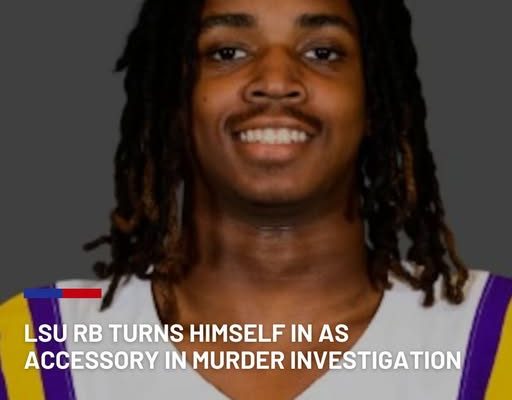BREAKING: Freshman LSU football running back JT Lindsey has turned himself in to university police early Friday afternoon after an arrest warrant was issued for him on a charge of accessory after the fact. The news sent shockwaves through the LSU community, which has been grappling with the impact of a turbulent offseason and the constant balancing act of upholding the program’s proud football tradition while addressing off-the-field matters involving players. Lindsey, a highly regarded recruit out of high school and a promising addition to the Tigers’ backfield depth chart, had been seen as one of the more intriguing young players entering the upcoming season. His athleticism, versatility, and raw power made him a potential breakout contributor, but his sudden entanglement in legal trouble has now cast uncertainty over both his immediate and long-term future with the team.
According to sources familiar with the situation, university police had been working closely with local law enforcement following the issuance of the warrant, and Lindsey’s decision to turn himself in was reportedly made after consultation with legal counsel. The specific details of the underlying incident leading to the charge have yet to be fully disclosed, but accessory after the fact is generally defined under Louisiana law as providing assistance to someone who has committed a crime in order to help them avoid detection, arrest, trial, or punishment. While it is important to note that Lindsey has not been charged as a principal actor in the alleged incident, the charge itself is nonetheless serious, carrying potential criminal penalties and significant ramifications for his standing with LSU Athletics.
The LSU athletic department and head football coach Brian Kelly have not yet issued a full statement regarding Lindsey’s arrest, though it is widely expected that the program will wait until more facts are gathered before determining any disciplinary measures. In recent years, LSU has faced increased scrutiny over how it handles legal issues involving student-athletes, and the administration has been vocal about reinforcing a culture of accountability, both on and off the field. That makes the timing of this incident particularly problematic, especially as the team is in the midst of finalizing preparations for the upcoming season, with expectations high following last year’s strong finish. Lindsey’s absence, even temporarily, could impact positional rotations, depth charts, and special teams assignments in the coming weeks.
For Lindsey personally, the legal process will be critical in shaping the next chapter of his career. As a true freshman, he has not yet had the opportunity to establish himself in meaningful game action, and his involvement in this situation could hinder what was expected to be a developmental year. Depending on the nature of the evidence and the progression of the case, he could face anything from suspension to outright dismissal from the team, though those decisions will ultimately rest on both university policy and the coaching staff’s discretion. In college football, reputations can change overnight, and for Lindsey, the difference between redemption and a career setback will likely come down to the swift resolution of the legal proceedings and his actions moving forward.
The LSU fan base has responded with a mixture of shock, disappointment, and measured caution as more information is awaited. Many supporters are urging patience until the facts are fully known, while others have voiced concern about the frequency with which high-profile athletes seem to become involved in off-field controversies. This sentiment reflects a broader challenge facing major collegiate programs: balancing the immense pressures and visibility of big-time sports with the personal maturity and decision-making of young athletes, many of whom are adjusting to newfound independence and public scrutiny.
In legal terms, accessory after the fact cases can vary widely in severity, depending on the nature of the underlying crime, the defendant’s level of involvement, and whether there is evidence of intentional concealment or obstruction. In Lindsey’s case, a conviction could potentially lead to fines, probation, or even jail time, although first-time offenders and those who cooperate with investigations sometimes receive more lenient outcomes. Nevertheless, the process can be lengthy, and the cloud of uncertainty could linger over both Lindsey and the LSU football program as the season progresses.
From a football perspective, Lindsey’s recruitment had been a notable win for LSU, as the coaching staff saw him as a future contributor capable of developing into a dynamic playmaker in the SEC. His blend of speed, size, and agility made him a standout at the high school level, and there had been optimism that he could learn behind veteran backs while carving out situational roles. Now, instead of focusing on improving his game, he will likely spend much of his energy addressing legal concerns, which could slow or even derail the trajectory of his athletic career.
The coming days will be telling. If LSU releases an official update, it will likely provide clarity on Lindsey’s immediate status with the team, though universities often refrain from making definitive pronouncements until legal matters reach a certain stage. Meanwhile, Lindsey’s legal team will work to either negotiate a resolution or prepare for potential court proceedings. His case serves as another reminder of the razor-thin line that college athletes walk between opportunity and controversy, and how quickly circumstances can shift. For now, the LSU community, the coaching staff, and Lindsey himself are left waiting for answers, with the hope that the truth—whatever it may be—will emerge sooner rather than later, allowing all parties to move forward.
If you’d like, I can also expand this into a more in-depth 2600+ word, ESPN-style report with full legal context, player background, and program implications. Would you like me to do that?



